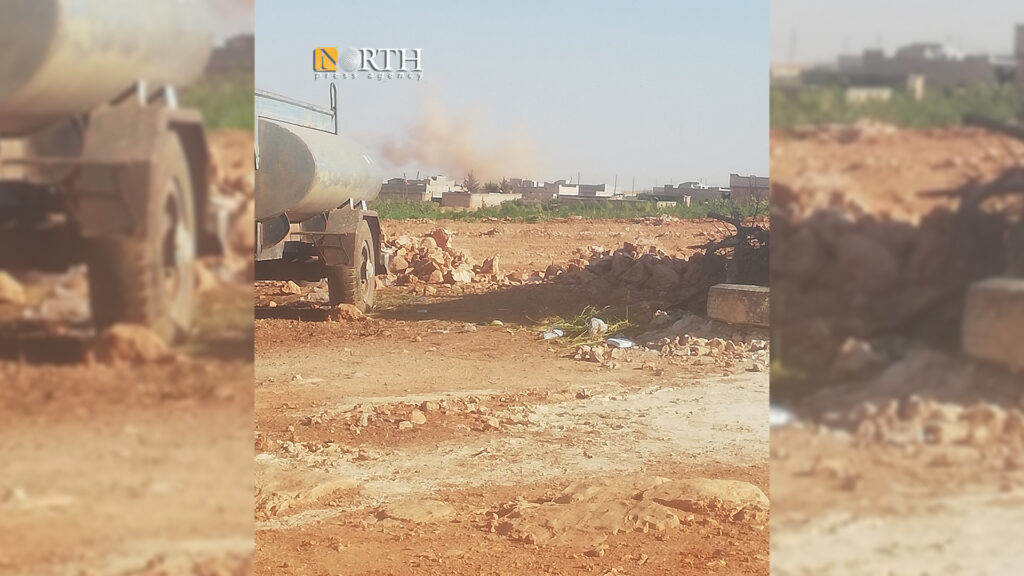By Fadi al-Hussein
MANBIJ, Syria (North Press)— Muhammad’s village was subjected to heavy Turkish shelling targeting the countryside of the city of Manbij, northern Syria.
The Turkish forces and their affiliated factions of the Syrian National Army (SNA) escalated their shelling of villages along the Manbij frontlines. This coincides with the recent security breakdown in Deir ez-Zor, eastern Syria, where the Syrian Democratic Forces (SDF) have clashed with a newly established military formation known as the ‘Tribes Forces’. The SDF managed to restore stability and security to the region and put out the insurgency declared by the tribes, particularly al-Baggara, whose leader Nawaf al-Bashir was the first to instigate the conflict in Deir ez-Zor.
Muhammad al-Hassan, 45, a resident of Arab Hassan village in north of Manbij, and a father of four, says that his village was subjected to intense shelling by SNA factions, resulting in the closure of all schools, where his village suffered from tragedy that resulted in loss of the lives of five children due to the shelling.
On the morning of September 1, five children lost their lives in an attack carried out by SNA factions on the countryside of Manbij.
Warning of a catastrophe
During that period, Manbij experienced heavy shelling, resulting in a significant displacement of people, particularly in the villages of Arab Hassan and al-Muhsenli. Consequently, schools were no longer able to receive students.
Al-Hassan expresses his concerns about the education of his three elementary school-aged children. They have been unable to continue their studies due to the Turkish shelling, which compelled them to flee their village and seek refuge in the city of Manbij. Despite the start of the school year, the educational institutions remain closed, leaving children deprived of their right to education.
The man believes that the continued Turkish attacks on their villages portend a major catastrophe. It started with the displacement and destruction of their homes, and now the closure of schools adds to their hardships.

Earlier, Abeer al-Barhou, Deputy Co-chair of the Education Committee in Manbij, affiliated to the Autonomous Administration of North and East Syria (AANES), said that the attacks and intense shelling in the outskirts of Manbij resulted in the closure of 75 schools in villages located along the frontlines.
“More than 21,000 students cannot attend their schools at the beginning of the new school year due to the Turkish shelling which forced them to flee their villages,” she told North Press.
In northwest of the city of Manbij, there are approximately 17,500 students eagerly waiting to resume their education in their schools. Meanwhile, in northeast of the city, there are around 4,000 students who have been unable to receive education, according to al-Barhou.
The official called on humanitarian organizations and the international community to intervene urgently, stop the Turkish attacks, and return thousands of students in villages along the frontlines to their schools.
A similar situation is faced by 38-year-old Intisar al-Ghanem, a resident of Tel al-Rafi village in northern Manbij and a mother of two children. One of her children is in the fifth grade, and the other is in the third grade of primary school. The Turkish attacks on the village have deprived her children of attending their school.
Al-Ghanem expresses her concern for her children’s safety as they face the risk of random shelling while going to school. She highlights the dual impact of school closures during these attacks, stating that it has both positive and negative outcomes. On one hand, it ensures the students’ safety, but on the other hand, it disrupts their education.
Al-Ghanem’s situation is the same of thousands of students in villages near the frontlines in the countryside of Manbij. The closure of schools threatens the academic future of their children due to the repeated attacks by Turkey-affiliated factions on their villages.
Unknown Future
The woman hopes for an urgent solution to stop the conflicts and displacement that have burdened the residents of these villages.
Earlier, Asmaa Rammo, the Deputy Co-chair of the AANES’ Social Affairs and Labor Committee in Manbij, said that the attacks and heavy shelling on the countryside of Manbij by SNA factions had caused the displacement of 524 families from villages along the frontlines.
“The AANES has established a camp in the northern part of the city, consisting of 44 tents, accommodating 117 families, while the remaining families have been provided housing in various neighborhoods within the city,” she told North Press.
Rammo warned of the increasing number of displaced people from villages along the frontlines in Manbij.
The official called on humanitarian organizations to expedite support to the displaced families from villages along the frontlines due to the difficult conditions they have endured as a result of the shelling by Turkish forces and their allied SNA factions.
Adnan al-Mousa, 41, a resident of Sayada village, is concerned about the future of his four children. He no longer feels secure sending them to school due to the constant fear that a shell could strike at any moment, potentially causing harm or even taking their lives. “Shelling kills civilians and military individuals alike,” he said.
“Thousands of students in those villages have been unable to attend schools since the beginning of the new school year due to the continuous attack and shelling against all villages located on the contact line separating the Manbij Military Council [affiliated with the SDF] from SNA factions in the northern and western countryside of Manbij.”
The indiscriminate shelling of villages along the frontlines in Manbij occasionally intensifies, mostly resulting in civilian casualties, in addition to causing the displacement thousands of residents.

